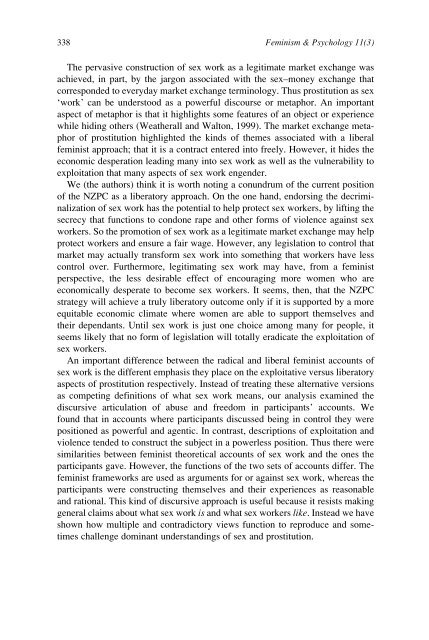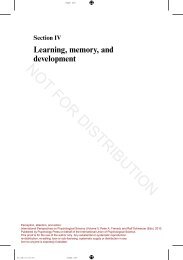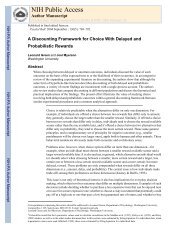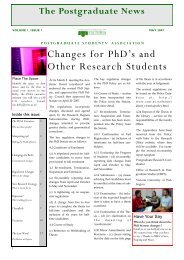A Feminist Discourse Analysis of Sex 'Work' - of /courses - Victoria ...
A Feminist Discourse Analysis of Sex 'Work' - of /courses - Victoria ...
A Feminist Discourse Analysis of Sex 'Work' - of /courses - Victoria ...
You also want an ePaper? Increase the reach of your titles
YUMPU automatically turns print PDFs into web optimized ePapers that Google loves.
338 Feminism & Psychology 11(3)<br />
The pervasive construction <strong>of</strong> sex work as a legitimate market exchange was<br />
achieved, in part, by the jargon associated with the sex–money exchange that<br />
corresponded to everyday market exchange terminology. Thus prostitution as sex<br />
‘work’ can be understood as a powerful discourse or metaphor. An important<br />
aspect <strong>of</strong> metaphor is that it highlights some features <strong>of</strong> an object or experience<br />
while hiding others (Weatherall and Walton, 1999). The market exchange metaphor<br />
<strong>of</strong> prostitution highlighted the kinds <strong>of</strong> themes associated with a liberal<br />
feminist approach; that it is a contract entered into freely. However, it hides the<br />
economic desperation leading many into sex work as well as the vulnerability to<br />
exploitation that many aspects <strong>of</strong> sex work engender.<br />
We (the authors) think it is worth noting a conundrum <strong>of</strong> the current position<br />
<strong>of</strong> the NZPC as a liberatory approach. On the one hand, endorsing the decriminalization<br />
<strong>of</strong> sex work has the potential to help protect sex workers, by lifting the<br />
secrecy that functions to condone rape and other forms <strong>of</strong> violence against sex<br />
workers. So the promotion <strong>of</strong> sex work as a legitimate market exchange may help<br />
protect workers and ensure a fair wage. However, any legislation to control that<br />
market may actually transform sex work into something that workers have less<br />
control over. Furthermore, legitimating sex work may have, from a feminist<br />
perspective, the less desirable effect <strong>of</strong> encouraging more women who are<br />
economically desperate to become sex workers. It seems, then, that the NZPC<br />
strategy will achieve a truly liberatory outcome only if it is supported by a more<br />
equitable economic climate where women are able to support themselves and<br />
their dependants. Until sex work is just one choice among many for people, it<br />
seems likely that no form <strong>of</strong> legislation will totally eradicate the exploitation <strong>of</strong><br />
sex workers.<br />
An important difference between the radical and liberal feminist accounts <strong>of</strong><br />
sex work is the different emphasis they place on the exploitative versus liberatory<br />
aspects <strong>of</strong> prostitution respectively. Instead <strong>of</strong> treating these alternative versions<br />
as competing definitions <strong>of</strong> what sex work means, our analysis examined the<br />
discursive articulation <strong>of</strong> abuse and freedom in participants’ accounts. We<br />
found that in accounts where participants discussed being in control they were<br />
positioned as powerful and agentic. In contrast, descriptions <strong>of</strong> exploitation and<br />
violence tended to construct the subject in a powerless position. Thus there were<br />
similarities between feminist theoretical accounts <strong>of</strong> sex work and the ones the<br />
participants gave. However, the functions <strong>of</strong> the two sets <strong>of</strong> accounts differ. The<br />
feminist frameworks are used as arguments for or against sex work, whereas the<br />
participants were constructing themselves and their experiences as reasonable<br />
and rational. This kind <strong>of</strong> discursive approach is useful because it resists making<br />
general claims about what sex work is and what sex workers like. Instead we have<br />
shown how multiple and contradictory views function to reproduce and sometimes<br />
challenge dominant understandings <strong>of</strong> sex and prostitution.






